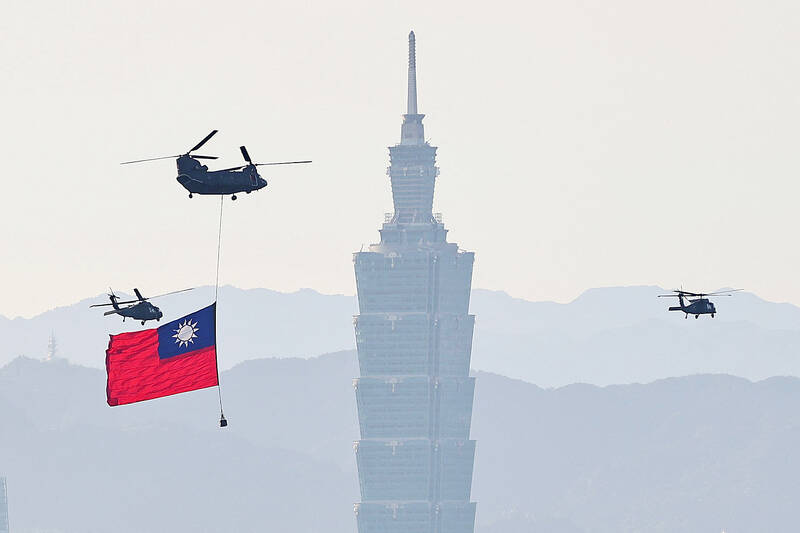Taiwan ranked 11th out of 63 major economies in the latest World Digital Competitiveness Ranking released on Wednesday, falling three spots from last year.
The annual list was prepared by the Switzerland-based International Institute for Management Development (IMD). The rankings are based on 54 criteria under three major categories: knowledge, technology and future readiness.
Taiwan saw the biggest drop in the technology category, falling from second to sixth place, with investment in telecommunications, where the nation ranked 57th, identified as an “overall top weakness.”

Photo: Reuters
However, he nation maintained its top ranking in the “IT & media stock market capitalization” and “mobile broadband subscribers” categories.
Taiwan ranked second in the “use of big data and analytics,” classified under future readiness, up two places from last year and identified as an “overall top strength.”
Under the future readiness category, Taiwan ranked third in terms of “agility of companies.”
Overall, Taiwan placed eighth in the future readiness category, down one place from last year.
In terms of knowledge, the nation ranked first in “total R&D personnel per capita,” and third in “higher education achievement” as well as “total expenditure on R&D” in relation to other areas of government spending.
However, the nation ranked 18th in knowledge, the lowest among the three major categories, with “total public expenditure on education” (52nd), “female researchers” (52nd), “pupil-teacher ratio in tertiary education” (50th), and “scientific and technical employment” (45th) identified as “overall top weaknesses.”
The Ministry of Digital Development said in a statement that the strengths and weaknesses identified in the rankings would serve as a reference for its policymaking as it looks to help Taiwan achieve digital transformation and boost its digital capabilities.
Minister of Digital Development Audrey Tang (唐鳳) said during an interview at the Taiwan Internet Governance Forum in Taipei on Wednesday that the ranking provided valuable input for policymaking, especially in areas where private-public cooperation can be improved.

CHIP RACE: Three years of overbroad export controls drove foreign competitors to pursue their own AI chips, and ‘cost US taxpayers billions of dollars,’ Nvidia said China has figured out the US strategy for allowing it to buy Nvidia Corp’s H200s and is rejecting the artificial intelligence (AI) chip in favor of domestically developed semiconductors, White House AI adviser David Sacks said, citing news reports. US President Donald Trump on Monday said that he would allow shipments of Nvidia’s H200 chips to China, part of an administration effort backed by Sacks to challenge Chinese tech champions such as Huawei Technologies Co (華為) by bringing US competition to their home market. On Friday, Sacks signaled that he was uncertain about whether that approach would work. “They’re rejecting our chips,” Sacks

NATIONAL SECURITY: Intel’s testing of ACM tools despite US government control ‘highlights egregious gaps in US technology protection policies,’ a former official said Chipmaker Intel Corp has tested chipmaking tools this year from a toolmaker with deep roots in China and two overseas units that were targeted by US sanctions, according to two sources with direct knowledge of the matter. Intel, which fended off calls for its CEO’s resignation from US President Donald Trump in August over his alleged ties to China, got the tools from ACM Research Inc, a Fremont, California-based producer of chipmaking equipment. Two of ACM’s units, based in Shanghai and South Korea, were among a number of firms barred last year from receiving US technology over claims they have

It is challenging to build infrastructure in much of Europe. Constrained budgets and polarized politics tend to undermine long-term projects, forcing officials to react to emergencies rather than plan for the future. Not in Austria. Today, the country is to officially open its Koralmbahn tunnel, the 5.9 billion euro (US$6.9 billion) centerpiece of a groundbreaking new railway that will eventually run from Poland’s Baltic coast to the Adriatic Sea, transforming travel within Austria and positioning the Alpine nation at the forefront of logistics in Europe. “It is Austria’s biggest socio-economic experiment in over a century,” said Eric Kirschner, an economist at Graz-based Joanneum

France is developing domestic production of electric vehicle (EV) batteries with an eye on industrial independence, but Asian experts are proving key in launching operations. In the Verkor factory outside the northern city of Dunkirk, which was inaugurated on Thursday, foreign specialists, notably from South Korea and Malaysia, are training the local staff. Verkor is the third battery gigafactory to open in northern France in a region that has become known as “Battery Valley.” At the Automotive Energy Supply Corp (AESC) factory near the city of Douai, where production has been under way for several months, Chinese engineers and technicians supervise French recruits. “They